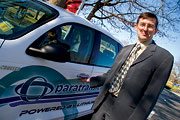A golden — er, green — opportunity?
To local green visionaries, Western North Carolina’s economic future could be as bright and shiny as an emerald city. Entrepreneurs, engineers, economic-development specialists and government representatives gathered at the Green Venture Forum in Enka on Nov. 21 to exchange ideas about a green-technology-based future for WNC. Hosted by the North Carolina State Energy Office in partnership with the Blue Ridge Angel Investor Network, the forum showcased clean-energy enterprises in the region and presented ideas for attracting more investment in “sustainable” business.

A green machine: David Wallace of the North Carolina State Energy Office shows off a hybrid-electric car powered by a lithium-ion battery. photo by Jonathan Welch
|
David Wallace, who heads up the State Energy Office, highlighted carbon-emission constraints and peak oil as the future economic drivers for renewable energy. “The explosion of renewables and electricity is really coming down the pipe,” he commented. “That is the potential that this region needs to be looking at.”
The State Energy Office and various groups have developed a strategy for tapping into those emerging opportunities, and the first step is to brand WNC as the “Sustainability Capital of the U.S.” in order to attract investors, according to Wallace. Land-of-Sky Regional Council recently conducted a survey of regionally based green businesses, renewable-energy providers, economic-development programs and existing infrastructure to gauge the potential support for such an initiative. Meanwhile, nonprofit group Sustainable Now has launched a public-education campaign to create a network of green businesses and raise awareness about “sustainable living.”
AdvantageWest CEO Dale Carroll announced that his economic-development group plans to host an event next year to attract environmental industries to the area. “This is such a sought-after location,” he noted. “There’s a lot of interest and a lot of momentum. We can really make a strong impression and grow businesses in this area with a green focus in mind.”
While the energy office, Land-of-Sky and financial advisors focused on the big picture, engineers and entrepreneurs brought specialized green innovation to the table. Martin Koebler of Hybrid Technologies showcased an electric car powered by a lithium-ion battery. Alexander Kovalchuk of TransEco Energy Corporation — an Asheville-based affiliate of a Russian natural-gas company — discussed his plans to expand compressed-natural-gas vehicle conversion and refueling stations outwards from Western North Carolina.
Rod Kagy, president of real-estate-development company Alexander Reagan LLC, spoke about integrating energy efficiency into building practices. Zona Lofts — a LEED-certified, 160-unit condo tower planned by his firm for downtown Asheville — is designed to use far less energy than a typical building its size, said Kagy. He also noted that his company plans to invest $3 million into a local enterprise that would manufacture green-building components using recycled materials.
Congressman-elect Heath Shuler was represented at the forum by staffer Randy Fleck, who said that though neither he nor Shuler knew much about renewable energy, he was certain that “Heath is very, very interested in being absolutely involved in getting Western North Carolina to be the hub of sustainability.”
Asheville City Council member Robin Cape, who was also present, did seem to know a thing or two about renewable energy, as she shared that she’d lived off the grid in a cabin powered by solar panels some years ago. “We don’t recognize culturally that renewables are the new wave,” she commented. “This is the next technology wave that, if we’re savvy enough, we can ride.” Cape also expressed a desire to encourage local-government support for green business initiatives.
Alternative-fuel startup Blue Ridge Biofuels, headed up by Brian Winslett, was also represented. Two years into its operation, the small-scale biodiesel supplier has plans to add five to 10 new pumps in the next 15 months. Winslett pointed to the grassroots, do-it-yourself mentality that led him to found the company, which uses waste veggie oil from area restaurants as feedstock for fuel production. “In Western North Carolina,” he said, “If you can’t find the job you want, there’s great opportunity to create it.”
For more information on Western North Carolina’s growing movement to “go green,” visit www.sustainablenow.us.



Before you comment
The comments section is here to provide a platform for civil dialogue on the issues we face together as a local community. Xpress is committed to offering this platform for all voices, but when the tone of the discussion gets nasty or strays off topic, we believe many people choose not to participate. Xpress editors are determined to moderate comments to ensure a constructive interchange is maintained. All comments judged not to be in keeping with the spirit of civil discourse will be removed and repeat violators will be banned. See here for our terms of service. Thank you for being part of this effort to promote respectful discussion.